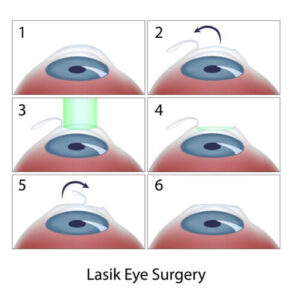Posted by: Manhattan LASIK Center
Have you ever dreamed about seeing without contact lenses or glasses? If so, you may have considered a vision correction procedure.
There are a lot of vision correction procedures available. Although LASIK is the most common and popular one, others are available.
Another incredible vision correction procedure is SMILE. Like LASIK, SMILE is a highly effective and minimally invasive procedure that can correct your refractive error.
SMILE has many of the same benefits as LASIK, but it’s even less invasive with a fast recovery, meaning you can instantly enjoy your new vision. Keep reading to learn why getting SMILE will give you something to smile about!
What is SMILE?
SMILE stands for SMall Incision Lenticule Extraction. SMILE is a vision correction procedure that removes a precise amount of corneal tissue to change how light passes through your cornea.
When you have a refractive error, it’s because of the shape of your cornea. Irregularities in the cornea affect the way light bends, or refracts, through it, making objects appear blurry if they’re too far away (if you’re nearsighted), too close (if you’re farsighted), or at any distance (if you have astigmatism).
Refractive laser vision correction procedures like LASIK fix the shape of your cornea by removing a small amount of your corneal tissue. SMILE is also a refractive laser vision correction procedure but follows a different process. SMILE disturbs far less tissue in the cornea, minimizing scarring and healing time.
SMILE surgery uses a ZEISS VisuMax femtosecond laser. The VisuMax femtosecond laser uses advanced technology, ensuring excellent patient results.
The femtosecond laser can remove tissue without penetrating the surface of your eye. It creates a lenticule, which is a disc-like shape, out of your cornea right under the surface of your eye.
Your surgeon then creates a tiny incision in the cornea, where they remove the lenticule through the incision. Because the opening is so small, the incision heals independently without needing stitches.
After undergoing SMILE, you’ll be able to recover quickly. You won’t feel any pain during the vision correction procedure thanks to numbing eye drops.
As you heal, you’ll experience minimal discomfort that will go away gradually. After healing, you can look forward to enjoying your incredible new vision and freedom from glasses and contact lenses.
Comparing SMILE vs. LASIK
Although LASIK is the most popular refractive laser vision correction procedure, SMILE is the top choice for many patients. SMILE and LASIK use a femtosecond laser, but how they use it is different.
A separate laser, called an excimer laser, is then used to shape the cornea underneath the flap. The flap then acts as a natural bandage while the eye heals.
While this makes LASIK recovery relatively easy and comfortable, SMILE is an even less invasive procedure since it doesn’t require creating a flap. It also doesn’t disrupt any tissue besides making the lenticule and the incision it’s removed through
SMILE is perfect for patients who aren’t good LASIK candidates due to thinner corneas, making it unsafe to undergo LASIK. If your corneas are not the right thickness, getting LASIK can result in severe complications to your vision.
Some patients also choose to have SMILE even though they may qualify for LASIK. Why? SMILE can be preferable because it’s an easier and faster procedure to heal after having.
Not only that, but it also causes less post-surgical discomfort, making it an excellent choice for patients with dry eyes. SMILE severs fewer tissues in the cornea, significantly reducing the chance of dry eye occurring.
However, one considerable difference between the two procedures is that LASIK can correct most refractive errors. These include nearsightedness, farsightedness, and astigmatism. SMILE can only correct nearsightedness and some astigmatism, so it isn’t a good fit if you’re farsighted.
If your prescription is within the acceptable limits for SMILE, the vision correction procedure is well worth getting, as it can give you something to smile about!
Experience True Visual Freedom
One of the main reasons patients have a vision correction procedure is to see without glasses or contact lenses. After you get SMILE surgery, you’ll be able to see with your own two eyes, eliminating all the annoyances that come with visual aids.
You won’t have to worry about your contact lenses drying out or falling out, and you won’t have to contend with smudges on your glasses. Say goodbye to the days of foggy glasses getting in your way in the winter, and hello to crisper vision.
When you can see without glasses and contact lenses, you’ll be able to do much more. You can save time, be more spontaneous, simplify your daily routine, and even increase your self-esteem. You’ll have more freedom to look however you want without relying on glasses, even as a backup to your contact lenses.
Choosing SMILE can give you more freedom in every area of your life, allowing you to live every day to the fullest with your best-ever vision! If that’s not something to smile about, what is?
See with a Whole New View
SMILE can help you see without contact lenses or glasses, but it can also help you see beyond what you could with visual aids. SMILE corrects your vision past your original prescription.
The vast majority of SMILE patients end up with 20/20 vision or better! After correcting your eyesight, you’ll have better depth perception and color perception.
Not only will the whole world look brighter and more vivid, but you’ll also have better hand-eye coordination and reaction times. Once you can see with your own two eyes, you’ll be more aware of the world around you, more alert, and more confident in yourself and your abilities!
Don’t wait to change your life with SMILE. Give yourself a reason to smile! Schedule your SMILE consultation today with the nation’s pioneer in SMILE procedures at Manhattan LASIK Center in Westchester, NY, to find out if SMILE is the right vision correction procedure for you!
Isn’t it time to see what’s really around you?




